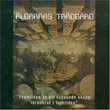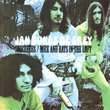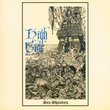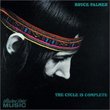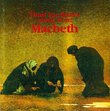| All Artists: Third Ear Band Title: Alchemy / Elements Members Wishing: 1 Total Copies: 0 Label: Gottdiscs Release Date: 8/2/2004 Album Type: Import, Original recording remastered Genres: Folk, Special Interest, Pop, Rock Styles: Experimental Music, Progressive, Progressive Rock Number of Discs: 2 SwapaCD Credits: 2 UPC: 881881001023 |
Search - Third Ear Band :: Alchemy / Elements
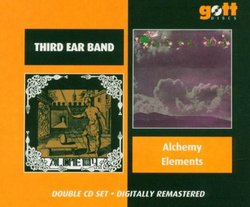 | Third Ear Band Alchemy / Elements Genres: Folk, Special Interest, Pop, Rock
First time as a double CD for the British progressive rock act's 1969 & 1970 albums. Gott Discs. 2004. |
Larger Image |
CD DetailsSynopsis
Album Description First time as a double CD for the British progressive rock act's 1969 & 1970 albums. Gott Discs. 2004. Similar CDs
|
CD ReviewsEl lado oculto del art rock P. SAAVEDRA | Lima - Perú | 08/23/2004 (5 out of 5 stars) "La primera vez que escuché a Third Ear Band fue en esa recopilación del sello Harverst "Picnic". Desde ese momento las cosas se le pueden complicar a cualquier amante-melómano del rock progresivo ¡¿Dónde ponemos esto?! Sweeney, un percusionista que usa ritmos simples y tribales, acompañado de un grupo de cuerdas (en especial recomiendo prestar atención al trabajo de las violas) puede hipnotizar con sus temas que van desde lo clásico y cerebral a lo arqueológico y espiritual. Esta producción es para mí una gran alegría, pues no quería gastar más de la cuenta con el disco "Elements" (sólo cuatro temas de corta duración, que bien podría venderse a un precio más cómodo); todo mejora si se le incluye "Alchemy", una joya de pretensión artística, nada, nada cercano al rock, pero de temperamento ilimitado. Dos obras plenas en una que cualquier audiófilo y coleccionista de alto conocimiento debe tener. Por supuesto que no hay nada mejor que los vinilos de esta banda (los artes gráficos son fantásticos), pero los precios podrían complicar otras necesidades." Alchemy/Elements - Third Ear Band Benedict | Cleveland, USA | 01/18/2006 (5 out of 5 stars) "This CD is awesome - I first listened to it in the early 70's in England and have wanted it ever since - it has probably some instrumental Scottish folk influence (I am somewhat of a novice at this) and somewhat the flavor of Pink Floyd - couldn't get it for many years because it was out of print and living in the US meant that people had never even heard of it -" So original nobody can get close to it mianfei | 09/11/2008 (5 out of 5 stars) "Although they toured with progressive rock bands like Pink Floyd, the original Third Ear Band up to Abelard and Heloise was perhaps the most unusual band around in those heady times. Their sound, based on the melodic oboe playing of Paul Minns and the danceable percussion of Glen Sweeney, had in a sense more similarities to free jazz than to rock but Third Ear Band never had the slightest cultural association with jazz and their rhythms were entirely un-jazzy. In fact, when the way violinist/violist Richard Coff and cellist Ursula Smith played is taken into account, it is fair to classify Third Ear Band as part of the then-burgeoning folk movement even though they did not revive any traditional songs but produced thier own epic compositions. In a way their music was like chamber folk played by a small ensemble of relative equals, though it is always Minns with his oboe playing who stands out.
"Alchemy", their 1969 debut album, already shows a band with a well-developed and deeply ingrained sound that might be far from an easy listen but still is extremely beautiful and completely melodic. The flow is not quite without rhythm in the way Joni Mitchell would later attain on "Song For Sharon", and it is a remarkable feat to add so much melody to a record that one can in parts at least truly dance to. "Mosaic" is a slow opener with a complex rhythm giving way to a much simpler one for the latter half, and this quiet tone contines on "Ghetto Raga", where Minns' oboe is at times as relaxed as if he were playing the flute. "Druid One" is a slight departure with Coff's violin at its most nearly "classical" in tone and playing some serious solos late in the piece, whilst "Stone Circle" is even quieter and more beautiful. The truly languid opening to "Egyptian Book of the Dead", however, shows the abstract tone they were to make their own on Abelard and Heloise, and when the silent beauty may be a very hard taste, Sweeney steps in with a groove that is pure dance music but does not detract from the sound the other members have established. "Area Three" is the purest dance/folk Third Ear Band were ever to make, whilst "Dragon Lines" and closer "Lark Rise", penned by original member Dave Tomlin (whom Ursula Smith replaced) and are the closet to traditional folk they would get but the blending of folk with experimental music was then groundbreaking if now familiar. "Elements", also titled "Third Ear Band", is still better than "Alchemy". The sound is much more solid and passionate, and Ursula Smith makes for much tighter playing evne though the pieces are longer. named after the four traditional elements, each piece has its own mood. "Air", the first, is ecstatic and relatively light and free-floating, yet the dense percussion rhythm of Sweeney sounds exactly like what many pop musicians were doing with synthesisers in my childhood of the 1980s. "Earth" is extremely danceable and moves in tempo from slow the extremely fast, and throughout Minns' oboe reaches notes never remotely attained on "Alchemy" as he manages to make a non-funk instrument sound like real funk. The overtones Minns is able to get, too, are startling. "Fire" is fast-paced throughout but has less emphasis on Sweeney's percussion, with the result that Minns, Coff and Smith create some remarkable, layered interplay as they follow each other with amazing effect. The finale "Water" is the only one of the four tracks that could have sat on "Alchemy": it is slow and dreamy like water is supposed to be but the much denser and tighter playing gives it a depth the first line-up of Third Ear Band never managed to achieve. "Elements" stands as a remarkable testimony to teh creativity spawned in the music world during the early 1970s. Nobody else had the idea of using the sort of line-up Third Ear Band did, and the dense, melodic, yet danceable sound they achieve here is something that should magae to startle the listener who can acquire a taste for it. The same lineup that recorded "Elements" would then move into even less accessible territory with Abelard and Heloise before then effectively breaking up and lamenting what they might have done had they not made the ridiculous attempt to become accessible with Macbeth." |

 Track Listings (8) - Disc #1
Track Listings (8) - Disc #1